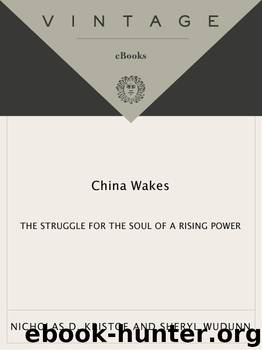China Wakes by Nicholas D. Kristof

Author:Nicholas D. Kristof [Kristof, Nicholas D.]
Language: eng
Format: epub
ISBN: 978-0-307-76423-2
Publisher: Knopf Doubleday Publishing Group
Published: 2011-09-06T16:00:00+00:00
Sima Qian finished his great historical work as a eunuch, “a mutilated being who dwells in degradation,” as he told his friend. Ever since then, Chinese intellectuals have all been a bit like that.
“Most Chinese intellectuals still feel castrated, in that we don’t dare stand up for what is right,” Huali, our friend the university lecturer, said glumly. “We don’t have outspoken dissidents, the way the Soviet Union produced Sakharov. We don’t have that tradition, and anyway, those in power are so strong that you can’t hope to get away with challenging them.”
The culture of silence derives in part from the traditional Chinese emphasis on keeping one’s head down. A popular saying reminds people that “the roof beam that sticks out is the first to rot.” Even if Confucian scholars were supposed to give candid advice to the emperors, they were not encouraged to go public with their criticisms. Scholars were always part of the state apparatus, and independent academic analysis was virtually unknown in China.
The Chinese Communist Party added to the traditional conformist pressure by insisting that citizens not only comply with all laws but also positively declare their support. To do this is to biao tai, or express one’s personal position. This began before the Communists even took power, and it has been an integral part of the control mechanism ever since.
After Tiananmen, every office in the country called a series of meetings in which employees had to stand up and biao tai, thanking the army for suppressing the “counterrevolutionary rebellion.” In some cases, even those who had lost family members were supposed to do this. And, for the most part, they did. Virtually all the people I knew went to these meetings and lied about their most fundamental beliefs.
For some people, it was a joke. For others, it was a game, no more lying than an author is lying when writing a novel—everybody knows that it is fiction, so there is no deception. For still others, lying was a painful necessity, and they had to be coaxed each step of the way by the person leading the discussion. Finally, there were those, particularly older people, who seemed to have become disoriented by their decades in the Communist Party. They couldn’t tell truth from falsehood.
After the June 4 Tiananmen crackdown, for example, one of our more courageous friends went to the home of a senior official. The official was horrified at what the army was doing and bitterly denounced the party leadership. “Those fascists!” she kept saying. “Those fascists!” My friend agreed and openly criticized the Communist leaders.
A couple of weeks later, after the hard-liners had reestablished party discipline, the danwei party committee called a meeting to expel my friend from the Communist Party. Some other young people were refusing to go along with the expulsion and were threatening to vote against it. The government minister in charge threatened to dissolve the entire department if my friend was not expelled. Everyone would be sent off to another job.
Download
This site does not store any files on its server. We only index and link to content provided by other sites. Please contact the content providers to delete copyright contents if any and email us, we'll remove relevant links or contents immediately.
| Africa | Americas |
| Arctic & Antarctica | Asia |
| Australia & Oceania | Europe |
| Middle East | Russia |
| United States | World |
| Ancient Civilizations | Military |
| Historical Study & Educational Resources |
The Sympathizer by Viet Thanh Nguyen(4379)
The Rape of Nanking by Iris Chang(4193)
World without end by Ken Follett(3468)
Ants Among Elephants by Sujatha Gidla(3452)
Blood and Sand by Alex Von Tunzelmann(3183)
Japanese Design by Patricia J. Graham(3157)
The Queen of Nothing by Holly Black(2577)
City of Djinns: a year in Delhi by William Dalrymple(2543)
Foreign Devils on the Silk Road: The Search for the Lost Treasures of Central Asia by Peter Hopkirk(2453)
India's Ancient Past by R.S. Sharma(2441)
Inglorious Empire by Shashi Tharoor(2427)
Tokyo by Rob Goss(2423)
In Order to Live: A North Korean Girl's Journey to Freedom by Yeonmi Park(2373)
Tokyo Geek's Guide: Manga, Anime, Gaming, Cosplay, Toys, Idols & More - The Ultimate Guide to Japan's Otaku Culture by Simone Gianni(2356)
India's biggest cover-up by Dhar Anuj(2343)
The Great Game: On Secret Service in High Asia by Peter Hopkirk(2327)
Goodbye Madame Butterfly(2243)
Batik by Rudolf Smend(2173)
Living Silence in Burma by Christina Fink(2058)
